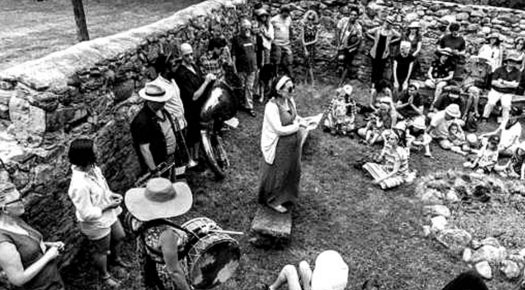
More than 200 Jews came together in Hillsburgh, Ontario, earlier this year to celebrate the opening of a 114-acre center for ecological land-based Judaism called Bela Farm, which is run by the Jewish environmental organization, Shoresh. Bela Farm’s design, aim and activities are all rooted in Jewish values and customs though it is not restricted to only adherents of Judaism.

Risa Alyson Cooper, executive director of Shoresh, said she was thrilled to see a rather diverse group of community members in attendance, from ultra-Orthodox Haredi Jews to secular individuals.
“For many in attendance, Shoresh is their only point of Jewish connection,” Cooper said. “Land-based Jewish tradition is unique in the community. It speaks to people in deep and profoundly meaningful ways, and bridges Jewish tradition with ecological stewardship. It is an expression of Judaism that is meaningful and relevant.”
The opening of Bela Farm featured a farmers’ market, performances by a cadre of Toronto-based Jewish musicians as well as a locally sourced desert reception.
Sabrina Malach, director of engagement for Shoresh, said, “The opening reflected a vision we’ve crafted collectively over the years.”
According to Malach, Shoresh has a seven-year strategy in place that is supposed to yield results by the next sabbatical year, also known as shmittah. The organization intends to undertake a native reforestation project, sowing thousands of seeds in honour of significant life-cycle events, and even build a bee sanctuary spanning acres of native wildflowers to support America’s depleting honeybee population. Promising to provide local sustainable honey to Jews to enjoy on the occasion of Rosh Hashanah, Shoresh believes by 2021, it will be able to produce an entire line of consumable products, including beeswax candles, honey, matzah, horseradish, pickles and herbal teas, all available for purchase at Bela Farm.
“We want the community to feel that Bela Farm is their own place,” Malach said. “We want to celebrate b’nai mitzvahs and, God willing, for weddings to take place on the farm. Our goal, over time, is to create and develop a new model for a community centre on a farm.”

While the United States is currently witnessing a surge of such Jewish environmental organizations, Cooper says Shoresh is one of a kind, as it is completely run by women. Reportedly, the organization organized a retreat for women, who together explored the cross-section of Jewish traditions, the link between Judaism and nature as well as debatable topics such as land and gender. Another four-day retreat that was organized in July invited community members to experiment on a deeper level with land-based Judaism, offering attendees sessions of prayer and meditation and chances to work in the fields as well as in workshops.
Malach described the retreat as “a procession of the land infused with music, poetry, art and Jewish texts.”
Bela Farm ranks among the biggest Jewish community farms in North America. It is the latest initiative by Shoresh, which also runs a pollinator garden at the University of Toronto and a community garden in Kensington Market.
Photo Credits: The Canadian Jewish News
